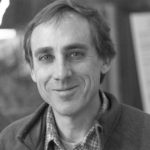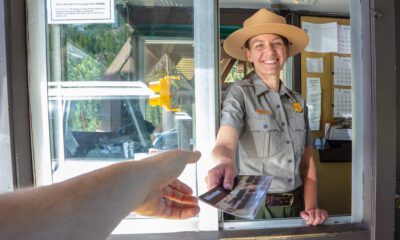Yellowstone
The New West: Yellowstone’s Dan Wenk prescribes courage if we want to save our wild ecosystem
Published
6 years agoon
Posted By
Outlaw Partners



CREDIT: David J Swift
By Todd Wilkinson EBS Environmental Columnist
Yellowstone National Park is what gives the Greater Yellowstone Ecosystem its centrifugal force.
While the 22.5-million-acre region is indeed the sum of all parts, absent the presence of America’s mother national park and, by dint of miracle, the long list of bio-geological wonders that still transcends its borders, this part of the country would be just like everywhere else.
We have grizzly bears, wolves, geysers, migrating big game herds, mystical trout waters, unblemished views and plenty of terrain to explore.
But conspicuously missing is leadership to deal with mounting problems being explored in depth at Mountain Journal (mountainjournal.org).
There’s no true galvanizing presence among Greater Yellowstone’s conservation community; no vision coming from land management agencies arrayed together in the Greater Yellowstone Coordinating Committee.
And there is little elected political leadership rising from the federal, state and local levels to formulate a cohesive strategy for dealing with issues such as growth, climate change, rising recreation pressure, chronic wasting disease and wildfire.
Thus, it makes dynamic figures stand out all the more. Last weekend, the most obvious in that category, Yellowstone Park Superintendent Dan Wenk, received an honorary doctorate from Montana State University in Bozeman.
Wenk gave a rousing acceptance speech, demonstrating courage that is now exceedingly rare.
“We are at a crossroads in our decision making as a community, a region and a nation in our attitude about protection of wild places,” he said.
In 2016, I wrote a column in which I cited Wenk’s former colleague, David Hallac, who served as Yellowstone’s science chief. He warned that while the ecosystem’s health is remarkable, it’s facing unprecedented converging threats that, unless confronted, will cause it to unravel.
Wenk picked up the theme, noting that it comes down to human decisions and a will to do the right thing by giving back more than we take.
“The least studied species in Yellowstone is the human. We don’t yet understand the affect of record visitation on either the visitor experience or the resources we protect,” Wenk said. “If we don’t understand these interrelationships, we may diminish, perhaps irreparably, the very things that attract people worldwide to this one-of-a-kind national park.”
Wenk ended his advice to college graduates that applies equally to everyone in the ecosystem who care about its exceptional character.
Said Wenk:
°“Tell people what they need to hear, not what they want to hear”;
° “Contribute to things bigger than yourselves”;
° “It’s easy to make decisions when you know what your values are”;
° “When you find yourself on the side of the majority, it’s time to pause and reflect”;
° “If you are not at the table, you are on the menu”;
° “Setting an example is not the main means of influencing others, it’s the only means”;
° “Misery is optional.”
For Wenk, the latter point means this: Let adventure in nature inspire you to be a better, more compassionate, sensitive and humble person who delights in the possibility of saving a place unlike any other.
Find levity in moments of intense gravity; ferret out reasons to have hope when all is thought lost; think beyond your own generation, as previous conservationists did for you; and step up and be counted in advocating for wild places and wildlife that do not have their own voice.
Wenk quoted a woman rancher from Belgrade who told him we must all sacrifice to save the character of the land. “It’s hard to condemn any one sector without acknowledging the warts and complexities of any other, but collectively we are degrading the magic that makes this region unique,” she told the newly-minted Dr. Wenk. “Can we slow down, scale back, and proceed with less of an air of entitlement?”
Finally, he noted, “Protection and management of public lands has never been more important than it is today. It is as simple and as complex as providing a place to disconnect from our daily world and reconnect with the environment and nature, a place for emotional and, if we are lucky, spiritual renewal.”
Finally, a note to all you great readers: Merry Christmas, Happy Holidays and here’s to an inspiring new year ahead.
Todd Wilkinson, founder of Mountain Journal (mountainjournal.org), is author of “Grizzlies of Pilgrim Creek” about famous Greater Yellowstone grizzly bear 399 featuring 150 photographs by Tom Mangelsen, available only at mangelsen.com/grizzly. His feature on the delisting of Greater Yellowstone grizzlies appears in the winter 2018 issue of Mountain Outlaw and is now on newsstands.
The Outlaw Partners is a creative marketing, media and events company based in Big Sky, Montana.


Upcoming Events
april, 2024
Event Type :
All
All
Arts
Education
Music
Other
Sports
Event Details
We all are familiar with using a limited palette, but do you use one? Do you know how to use a
more
Event Details
We all are familiar with using a limited palette, but do you use one? Do you know how to use a limited palette to create different color combinations? Are you tired of carrying around 15-20 different tubes when you paint plein air? Have you ever wanted to create a certain “mood” in a painting but failed? Do you create a lot of mud? Do you struggle to achieve color harmony? All these problems are addressed in John’s workbook in clear and concise language!
Based on the bestselling “Limited Palatte, Unlimited Color” workbook written by John Pototschnik, the workshop is run by Maggie Shane and Annie McCoy, accomplished landscape (acrylic) and plein air (oil) artists,exhibitors at the Big Sky Artists’ Studio & Gallery and members of the Big Sky Artists Collective.
Each student will receive a copy of “Limited Palette, Unlimited Color” to keep and take home to continue your limited palette journey. We will show you how to use the color wheel and mix your own clean mixtures to successfully create a mood for your paintings.
Each day, we will create a different limited palette color chart and paint a version of a simple landscape using John’s directives. You will then be able to go home and paint more schemes using the book for guidance.
Workshop is open to painters (oil or acrylic) of any level although students must have some basic knowledge of the medium he or she uses. Students will be provided the book ($92 value), color wheel, value scale and canvas papers to complete the daily exercises.
Sundays, April 14, 21 and 28, 2024
Noon until 6PM.
$170.
Time
14 (Sunday) 12:00 pm - 28 (Sunday) 6:00 pm
Event Details
Please join the Arts Council of Big Sky for free music from Jacob Rountree at the Wilson Hotel Lobby Bar from 5-7 p.m.
Event Details
Please join the Arts Council of Big Sky for free music from Jacob Rountree at the Wilson Hotel Lobby Bar from 5-7 p.m. on April 24.
Jacob Rountree is an alternative/indie songwriter living in the stunning alpine of Montana. Contemplative yet playful, his lyric forward style is reflective of his love for philosophy, poetry and quantum physics.
Time
(Wednesday) 5:00 pm - 7:00 pm
Location
The Wilson Hotel
145 Town Center Ave
Event Details
Trivia from 7 to 9 p.m. at The Waypoint in Town Center. Participation is free, food and beverages available.
Event Details
Trivia from 7 to 9 p.m. at The Waypoint in Town Center. Participation is free, food and beverages available.
Time
(Wednesday) 7:00 pm - 9:00 pm
Location
The Waypoint
50 Ousel Falls Rd










